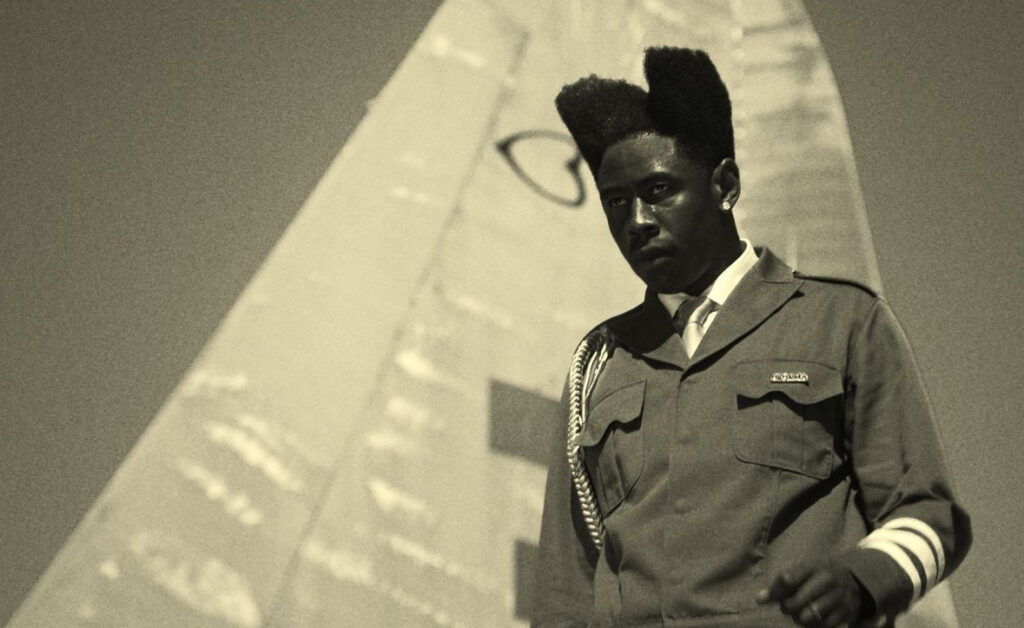Kim Petras, Dr. Luke, and How Abusers Hide In the Dark
Written by Adison Eyring on November 16, 2018
On the first of October this year, Kim Petras released her horror-themed debut EP, TURN OFF THE LIGHT, VOL. 1, to ring in the spooky season.
Similar to everything released by Petras in the past, the project is maximalist-pop perfection which is so playfully feminine that you can practically hear the hot pink. With the spooky twist on her typical bubblegum output, it sounds like the soundtrack to a Halloween party thrown in the Barbie Dreamhouse. As dark as the project is, the realities surrounding it are much bleaker. I have an issue with the convenient amnesia our culture seems to have in regards to artists who are uncovered to be abusers. My problem with Petras doesn’t lie in her image or work. Rather, it’s what lurks in the dark (i.e. credits) of every song on the EP: Lukasz Gottwald, otherwise known as Dr. Luke.

Photo by Charlotte Rutherford
Just three years after Kesha sued him to void their contract due to alleged verbal, sexual, and physical abuse, Dr. Luke began working on a new project. Since her debut, Gottwald has been mentoring, writing, and producing for Petras, even after all of the allegations against him were publicized. Consider this the musical equivalent of forcing unsuspecting comedy club audiences to watch your surprise sets, or sneakily shooting your new film in two countries known for their denunciation of the #MeToo movement.
Petras, meanwhile, has done little to adequately address her fans’ discomfort with the association. When called out for working with Gottwald, she typically tries to take two approaches: both the feminist way and the ‘I’m gonna keep working with him though’ way, despite the fact that both of these standpoints on this issue are mutually exclusive. Placating statements like, “I respect them both and…whatever will happen will happen,” shows where she really stands.
In the year since the #MeToo movement began, the campaign has barely brushed the music industry. Nicki Minaj recently collaborated with an accused pedophile to make a song that reached number 3 on the Billboard Hot 100. Additionally, rapper XXXTentacion continues to see postmortem success despite abuse allegations. With the industry’s methods of dealing with internal abusers still in its infancy, it’s understandable how Dr. Luke’s work with indie darling Petras has flown under the radar. However, it’s still worth being discussed. It’s also emblematic of a longstanding problem with prominent women in the music industry: Is it possible to support talented female artists without inadvertently supporting the abusive men behind-the-scenes?

Photo by Bob & Nadya Gruen
When allegations against Dr. Luke first came to light, comparisons were made to cases of pop stars of the past like Tina Turner and Ronnie Spektor. Famed musician Ike Turner famously discovered a 16-year-old Tina Turner, elevated her to fame, and married her, all the while violently abusing her along the way. Ronnie Spektor, lead singer of The Ronettes, found both love and success through producer Phil Spektor, only for her to later reveal the astounding aggression and control she had to live under. Like Kesha, women across the entire music industry have had to live with their music being intrinsically linked to a looming, abusive figure.
Speaking of Kesha, despite her court case not getting very far, she came out of the situation strong. She released the most touching, and personal comeback single of 2017 to high critical acclaim. Unfortunately, Dr. Luke still has direct financial ties to all of her artistic output. Unlike Petras, Kesha entered the deal blind to Gottwald’s dark side, and their professional relationship continues nonconsensually.
Petras’ parallels with Kesha don’t start or end with the Dr. Luke credit. Her image in a way harkens back to Kesha in her early days: both caricatures of whatever version of femininity we find most hedonistic at the time. Kesha brought feather hair extensions and copious amounts of vodka to the stage, and Petras countered with a signature bleached side-pony and maxed-out credit cards. Her carefully calculated brand is a clear homage to the wild girls and cookie cutter pop stars of the 2000s, while her autonomy (and nonchalant trans pride) is a necessary update. And, admittedly, Kesha’s music produced by Gottwald still bangs, though I consider it due to Kesha’s own songwriting and vision. However, as with Petras, no matter how little he contributed to a track he still receives royalties, and that feels dubious to ignore.

Photo by Jefferson Siegel
Is it morally okay to listen to music that violent abusers profit off of? I don’t have an answer – or, I do, but my moral idealist answer conflicts with the number of times I’ve streamed I Don’t Want It At All. Some people are just that talented, and it’s fair to acknowledge that Petras is not on Harvey Weinstein levels of evil, even if Dr. Luke may be. The fact of the matter is that Petras is ridiculously good at being a pop star in the making, even if I think she’s playing willfully ignorant by working with a well-known abuser. Ultimately, the music industry is going to have to reconsider its standards for abuse, employ more women behind-the-scenes, and take all allegations seriously. In the meantime, I’ll hold steadfast in not buying Petras’ tickets or merch (see, I do have some values).
As with Kesha, Tina, and Ronnie before her, I desperately want Kim Petras to succeed despite who is profiting off of her, especially since pop music is in desperate need of more trans voices. Still, there’s something gut-wrenching about hearing her sing about violent obsessions on tracks written by Gottwald after having turned the lights back on.





